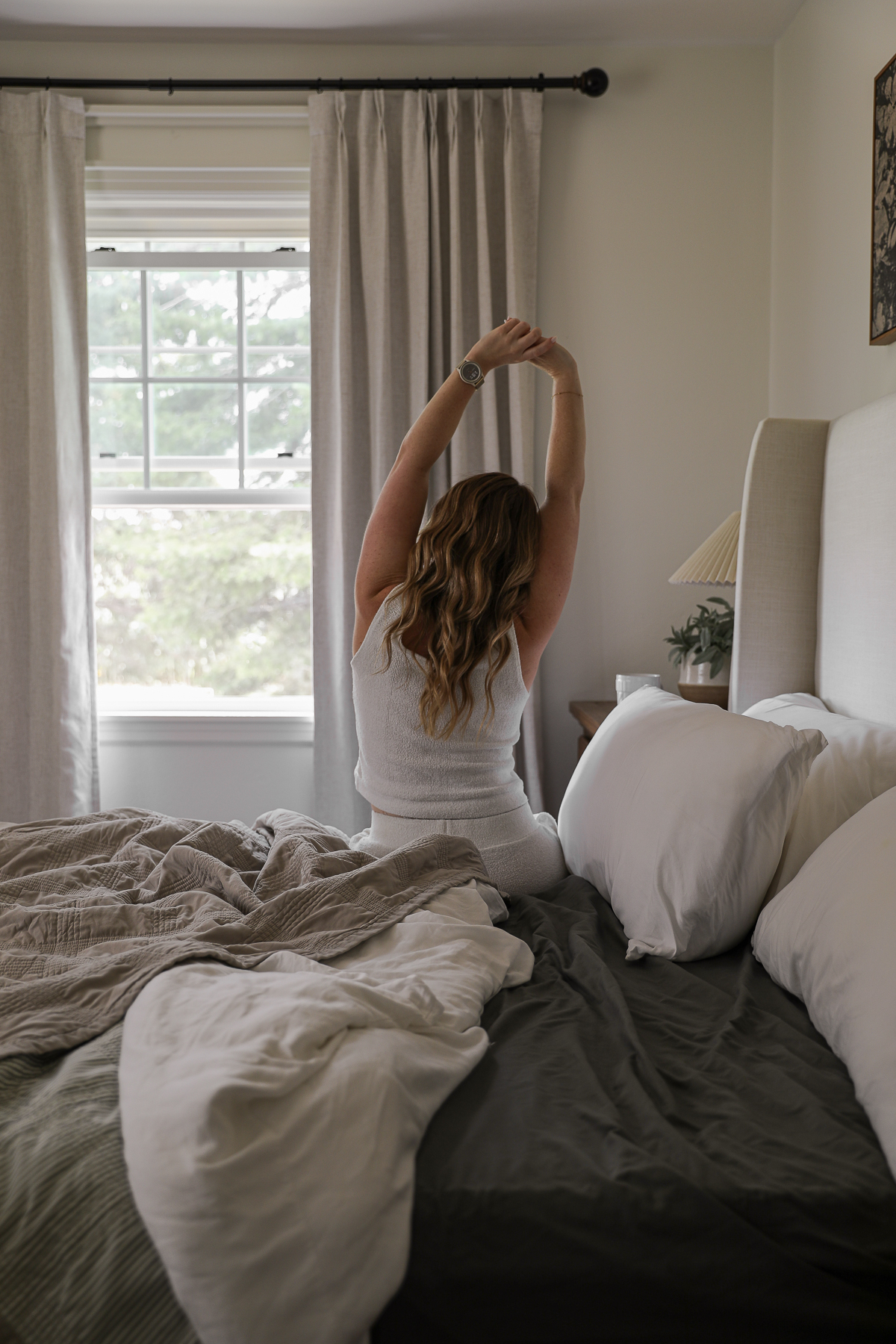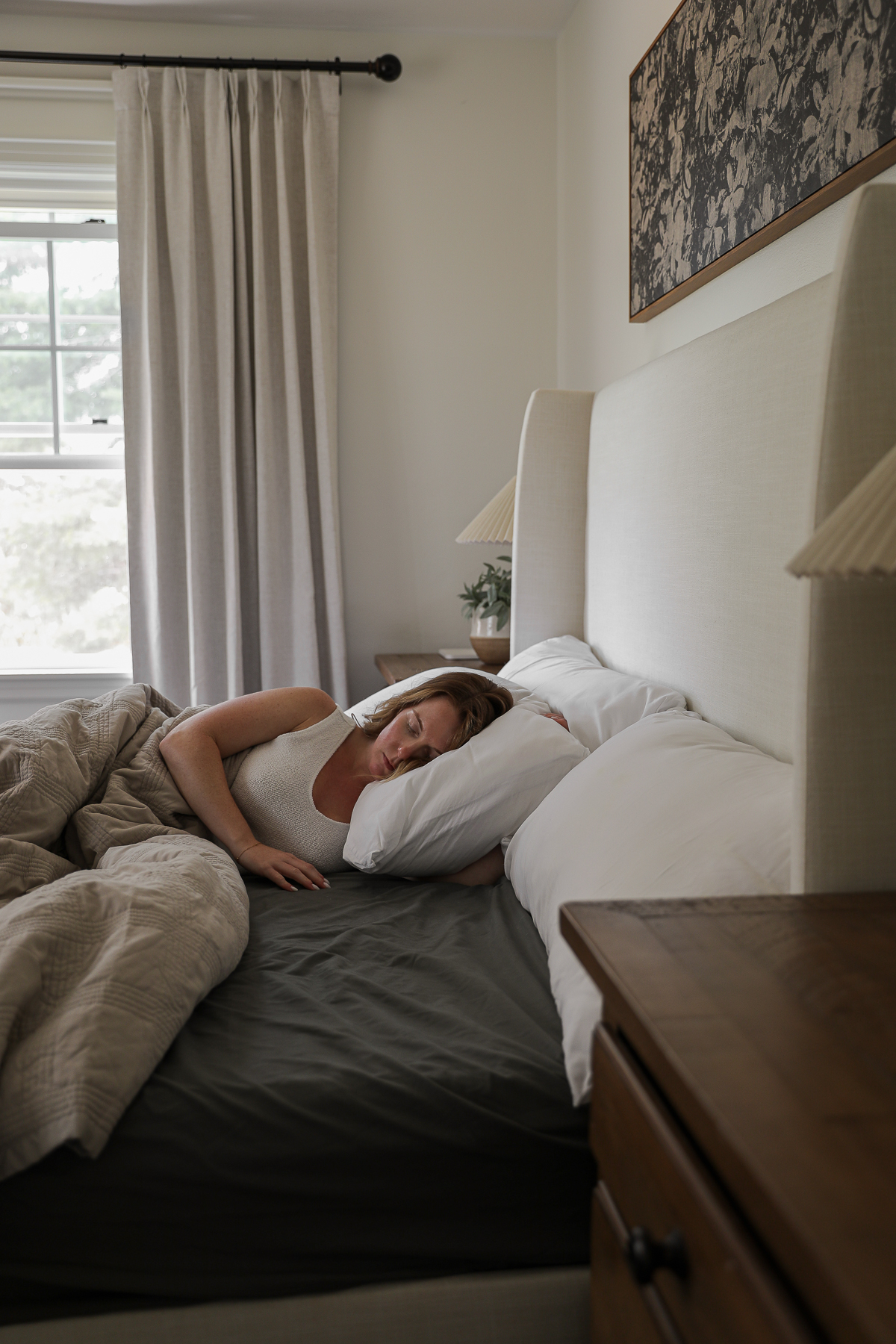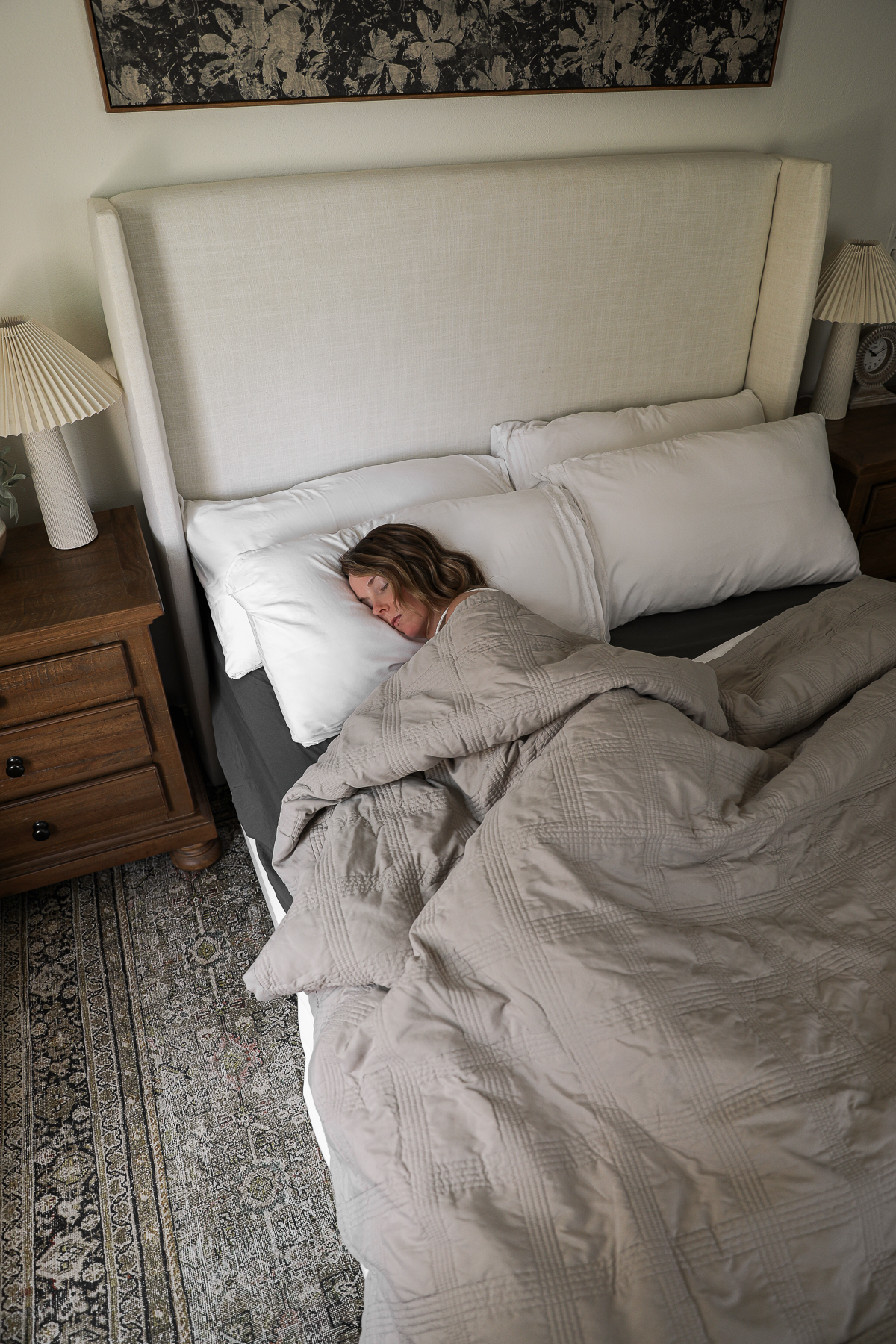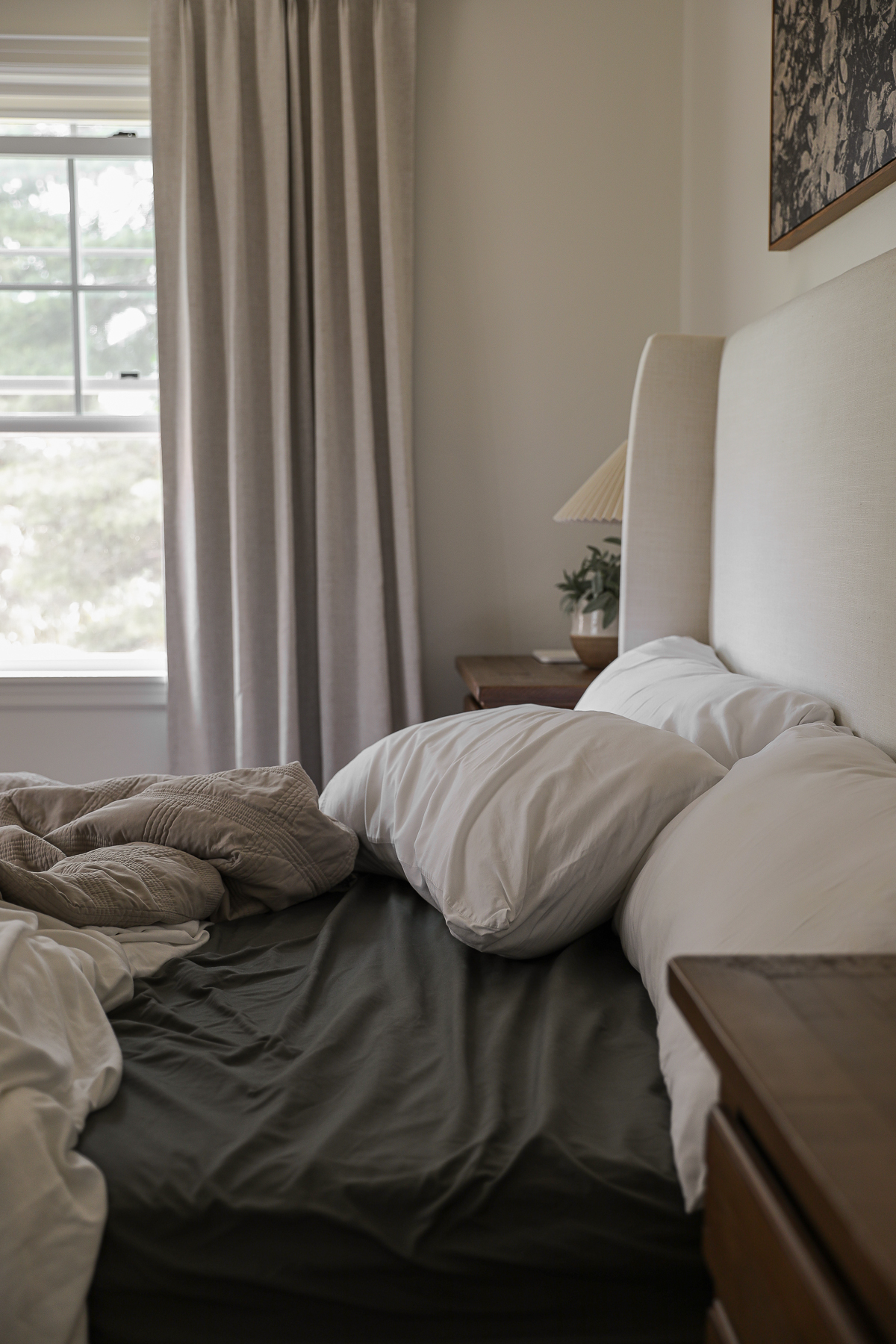
If you’ve ever wondered why you’re craving sugar at 3 p.m., why your jeans feel tighter even though you’re “doing everything right,” or why your patience is paper-thin by bedtime — your sleep might be the missing piece. Rest isn’t wasted time; it’s one of the most powerful tools you have for weight management, hormone balance, stress resilience, and energy. And as women age, sleep becomes even more critical as hormones shift and stress loads increase.
Restorative rest is essential in how we feel and function each day, and below is a comprehensive guide on why sleep matters so much and what it does for your body.

6 Things That Happen While You Sleep
Sleep isn’t just downtime — it’s the most active repair and reset your body gets every single day. Here’s what happens while you sleep:
- Weight Management & Metabolism
Poor sleep disrupts hunger and fullness hormones (ghrelin and leptin), leading to more cravings and overeating. It also reduces insulin sensitivity, making blood sugar harder to control and weight loss more challenging.
- Hormone Balance
While you sleep, cortisol (your stress hormone) resets and lowers, paving the way for balanced estrogen, progesterone, and growth hormone production. These hormones play key roles in energy, mood, recovery, and metabolism — especially as women approach their late 30s and 40s.
- Brain Detoxification
Deep sleep activates the glymphatic system, your brain’s natural cleaning cycle. Cerebrospinal fluid literally washes through your brain tissue, flushing out waste products, toxins, and beta-amyloid proteins (linked to cognitive decline and Alzheimer’s). Skimping on sleep slows this process, leaving your brain “clogged” and foggy.
- Cellular Repair & Detox
Your liver, kidneys, and digestive system also work harder at night to filter toxins and repair cells. This nightly detoxification process supports clearer skin, stronger immunity, and reduced inflammation.
- Mental Health & Stress Resilience
Sleep is like emotional housekeeping. During REM cycles, your brain processes memories, regulates emotions, and “files away” stress from the day. Without enough sleep, cortisol levels rise, anxiety feels heavier, and little stressors feel harder to manage.
- Energy & Productivity
Restorative sleep translates to better focus, creativity, and stable energy throughout the day. Instead of relying on caffeine or sugar, your body can naturally fuel itself.
Big Takeaway
Sleep isn’t a luxury. It’s your body’s most powerful built-in detox, repair, and reset system — the foundation that every other healthy habit stands on. Without it, even the “perfect” diet or workout can only go so far.

How Much Sleep Do You Really Need?
Most adults need 7–9 hours of sleep each night. This isn’t just a “nice to have” — it’s the amount research consistently shows supports optimal brain function, hormone balance, metabolism, and long-term health. Here’s why this range matters:
- Less than 7 hours: Even mild sleep restriction increases cortisol, decreases insulin sensitivity, and cuts into REM and deep sleep — the two stages that do the heavy lifting for brain detox, memory consolidation, and physical repair. You may “get by” for a few nights, but over time the deficits add up, leaving you more anxious, hungrier, and more prone to weight gain and illness.
- 7–9 hours: This sweet spot allows your body to cycle through the full 4–6 sleep cycles most people need. You’ll get enough deep sleep for physical repair and enough REM sleep for mood and cognitive health.

Why Women Often Need More Sleep
Here’s the part most sleep guidelines don’t explain: women’s sleep needs can shift throughout the month and across different life stages.
Menstrual Cycle Fluctuations
During the luteal phase (the 10–14 days after ovulation leading up to your period), progesterone levels rise. Progesterone can increase your body temperature slightly, which makes it harder to stay asleep through the night. It’s also associated with feeling more fatigued during the day, meaning your body benefits from leaning toward the higher end of the 7–9 hour range.
When menstruation begins, hormone levels drop (both progesterone and estrogen), and this shift can impact neurotransmitters like serotonin and melatonin that regulate sleep. Many women also deal with cramps, bloating, or discomfort that make it harder to fall and stay asleep. This is another time when prioritizing closer to 9 hours of rest can help your body manage inflammation, balance mood, and restore energy.
Think of it this way: your body is working harder during these phases — regulating temperature, repairing tissue, and managing pain and inflammation. Sleep is when these processes happen most efficiently, so giving yourself an extra hour (or two) is a form of proactive self-care that supports both hormonal balance and overall well-being.
Perimenopause and Menopause
As women transition into perimenopause and menopause, hormonal shifts make restorative sleep harder to come by — yet more important than ever. Estrogen and progesterone both decline during this stage of life. Progesterone has a natural sedative effect, so when levels drop, women often notice more difficulty falling and staying asleep. Lower estrogen can also contribute to hot flashes, night sweats, and temperature dysregulation, all of which fragment sleep cycles and reduce time spent in deep, restorative stages.
On top of hormonal changes, sleep disorders like insomnia and sleep apnea become more common in midlife women. Poor sleep also compounds other perimenopausal and menopausal symptoms — think mood swings, brain fog, weight gain, and increased stress reactivity. That’s why aiming for the upper end of the recommended 7–9 hours becomes especially critical. Even if you can’t always extend the length of sleep, prioritizing habits that improve sleep quality (cooler bedroom, light exposure in the morning, limiting alcohol, managing stress) will make a huge difference.
In short, during perimenopause and menopause, your body is already under more stress trying to adapt to shifting hormones. Adequate, high-quality sleep acts like a buffer — protecting cognitive function, supporting metabolism, reducing inflammation, and helping you feel more balanced and energized.

So the next time you’re tempted to push bedtime later or power through on coffee, remember this: sleep isn’t wasted time, and it isn’t selfish. It’s your body’s built-in reset button, restoring balance to your hormones, metabolism, mood, and energy so you can show up each day with patience, joy, and confidence. That extra hour of sleep tonight is the simplest, most powerful form of self-care you can choose, and your future self will thank you.
MORE WELLNESS ROUTINES:
Morning Sunlight: The Simple Daily Habit That Can Improve Your Sleep, Energy & Mood
Habits I’m Currently Focusing On
Supplements for Gut, Hormone, and Overall Health
Morning Skin Care Routine
Nighttime Skin Care Routine
STAY CONNECTED:
Shop my Posts | Shop my Amazon Store
Join our Community | Follow on Instagram
Follow on Pinterest | Follow on Facebook


Leave Your Comments